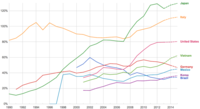Posts selected fromManagement Blog - Engineering Blog - Investing Blog and other blogs - Is Innovation Needed to Keep Manufacturing in the USA?
There is no ace in the hole. If countries want to keep manufacturing jobs they are going to have to do lots of things right. No country has such an advantage they can expect to rely on their country being more innovative (or offering cheaper labor, or their citizens working harder or…) than all the other countries in the world.
Innovation has been an advatage for the USA. It should continue to be an advantage for the USA but many other countries will innovate very well (Japan, Germany, China, Korea, Singapore, England…). The USA has many assets: transportation infrastructure, banking, rule of law, educated and skilled workforce, huge market, decent tax laws, engineering education… The key will be to keep focusing on the whole system (and fix things like huge budget deficient, huge current account deficit, excessive health care costs, excessive executive pay…).
I also believe a key competitive advantage will be in applying management improvement concepts such as lean manufacturing. continue reading: Is Innovation Needed to Keep Manufacturing in the USA? - American Manufacturing Successes
- New Look American Manufacturing
Many factors determine whether the USA will continue to lead the world in manufacturing. The USA has to continue to support a dynamic economic system, maintain a transportation system, improve the health care system, improve the educational system, maintain the rule of law, reduce excessive legal costs, improve the management of manufacturers etc.. Each country has to work on these and other systems to stay competitive globally.
...
Excessive regulation compared to what countries – China, India, Germany, Japan? If you are talking about environmental regulation, the USA has more than China less than Germany or Japan. If you are talking about permits to get things done I think the National Association of Manufacturers (NAM) needs to go try to do business in Japan, China, India, Thailand, Mexico… and see how easy it is to navigate the undocumented processes.
And does NAM think the USA is good at nothing? Don’t manufacturers here benefit from being the USA? What cost advantages does that give them? I think being a manufacturer in the USA offers huge advantages as well as some challenges. The prospects are good. continue reading: New Look American Manufacturing - IT Outsourcing to India Slowing (2006)
Outsourcing IT makes a lot of sense but it is complex to do well. The first rush of outsourcing was just an attempt to save money by moving work to sites where the workers could be paid less. This is classic economics and the economic theory has worked well. Capitalists moved work to where the competitive advantage was. The economic reaction was what you would expect – Indian IT wages raised drastically and other costs of doing business have continued to rise (much higher turnover as the opportunities that workers had expanded they jump from one job to another). continue reading: IT Outsourcing to India Slowing (2006) - Vacation: A Systems Thinking Perspective
Health care insurance costs are high, if you can get 1900 hours of work a year for the health care premium instead of 1500 hours that can add up to a great deal of savings... continue reading: Vacation: A Systems Thinking Perspective - Gladwell (and Drucker) on Pensions
The most influential management theorist of the twentieth century was Peter Drucker, who, in 1950, wrote an extraordinarily prescient article for Harper’s entitled “The Mirage of Pensions.” It ought to be reprinted for every steelworker, airline mechanic, and autoworker who is worried about his retirement. Drucker simply couldn’t see how the pension plans on the table at companies like G.M. could ever work.
Pension plans did work well for a short period of time. But recently they (along with the attached retiree health care) are one of the big problems facing large old companies: like GM. Gladwell talks about the dependency ratio for an economy and the dependency ratio of companies. Worsening dependency ratios can cause pension plans to kill companies (if they are not funded when the obligation is incurred) – as the company is forced to pay for more and more retirees with fewer and fewer workers. continue reading: Gladwell (and Drucker) on Pensions - Intellectual Property Rights and Innovation
How intellectual property influences innovation and growth in the economy depends on the application of intellectual property law. No intellectual property (IP) rights would hinder innovation. Complicated application of confusing and overreaching IP rights also hinders innovation. Now I see the USA systems as having overreaching claims of IP rights, IP rights granted for obvious ideas which then are used to extort those actually producing value and overall a system much in need of improvement.
Related: The Patent System Needs to be Significantly Improved - The New Deadly Diseases That Severely Damage our Economy
continue reading: Intellectual Property Rights and Innovation - Manufacturing Jobs
Focusing on manufacturing output and jobs and their importance to the economy makes sense. However, I think people need to update the model they use to set expectations of manufacturing job levels. And given a world in which no countries seem able to do gain manufacturing jobs, it seems more reasonable to expect a continuation of decreased jobs and increased output until that worldwide trend changes. continue reading: Manufacturing Jobs - The Benefits and Risks of Countries Taking on Government Debt
 - Historical Global Economic Data and Current Issues for Globalization
China and India/Pakistan accounted for 73% of the world manufacturing output in 1750. They continued to account for over half of global output even as later as 1830. By 1913, however, their share had dropped to 7.5%.
That shows how quickly things changed. The industrialization of Europe and the USA was an incredibly powerful global economic force. The rapid economic gains of Japan, Korea, Singapore, China and India in the last 50 years should be understood in the context of the last 200 years not just the last 100 years.
...
I believe he is onto something. I have for years been seeing the strains of “comparative advantage” in our current world economy. That doesn’t mean I am not mainly a fan of freer trade. I am. I don’t think complex trade deals such as TPP are the right move. And I do think more care needs to be taken to consider current economic conditions and factor that into our trade policies.
...
The complexity of the economic consequences of international trade require knowledge, skill, patience and practical thinking to create economic gains going forward. I am worried about the foolish leaders we are electing in many of the rich countries recently. They do not appear to understand complexity or value the importance of expertise, uncertainty and implementation of economic policy. The complexity today requires more understanding, study, learning and care than was required last century but instead we are electing people with less wisdom than ever (and we were not electing incredibly wise people very often in the past). continue reading: Historical Global Economic Data and Current Issues for Globalization - Tiny Homes – A Great Alternative (for some people)
Homes don’t have to be huge as they are now. The ever expanding USA single family home: average square footage of single-family homes in the USA: 1950 – 983; 1970 – 1,500; 1990 – 2,080; 2004 – 2,349.
Tiny houses are looking at going back even earlier than 1950, and that is a good idea. I would also like to see experiments with small houses along the lines of 1950s (or even a bit smaller). By reducing the high cost of housing we can drastically change personal finances for the non-rich in the USA (and elsewhere). continue reading: Tiny Homes – A Great Alternative (for some people) - Factfulness – An Extremely Valuable Book
 Data is extremely valuable in helping us make decisions and evaluating the effectiveness of policy. However it is critical to be careful. It is very easy to focus on meeting targets that seem sensible – increasing the number of hospital beds – but that lead to less effective policy.
...
The book relentlessly points out the great progress that has been made globally over the last 50 years and how that progress continues today and looks to be set to continue in the future. We have plenty of areas to work on improving but we should be aware of how much progress we have been making. As he points out frequently he has continually seen huge underestimation of the economic conditions in the world today. This book does a great job of presenting the real success we have achieved and the progress we can look forward to in the future. continue reading: Factfulness – An Extremely Valuable Book - The Continued Failure of the USA Health Care System and Our Politicians
 Providing a health care is extremely costly everywhere. Rich countries nearly universally provide a health care system that allows all citizens to get needed health care. Nowhere is it perfect and nowhere is it cheap. And nowhere is it more of a mess than in the USA.
Sadly those we elect in the USA have continued for the last few decades to keep the USA healthcare system the mess we have now. The Affordable Care Act took a relatively small step in addressing several of the most flawed aspects of the USA system. It left unaddressed many of the major flaws. Instead of taking where we are now and making improvements to address the problems left from decades of Democrat and Republican created and maintained USA health care policy all we have had are demands to “repeal Obamacare.”
This is exactly the type on avoiding improvements to maintain the existing (for the last few decades) broken healthcare system those in the USA must live with.
...
We need to elect people dedicated to improving results not those interested in repeating slogans and avoiding any actual work on actually making things better. continue reading: The Continued Failure of the USA Health Care System and Our Politicians - Personal Finance Considerations for Going into Debt for Education
 I think taking on debt for education is a sensible financial decision. But the level of the debt that is sensible must be considered.
When I went to college (too long ago) it was expensive, but not nearly as expensive as it is now (in the USA at least – I am not as familiar with the costs outside the USA other than knowing in many places that university education costs are very reasonable).
I don’t have any hard cutoff where I think taking on debt no longer makes sense. But I do think I would include cost as a major factor when deciding what college to attend if I were facing that decision today.
...
As I have said before the reason to chose a career is because that is the work you love, but in choosing between several possible careers it may be sensible to consider the likely economic results. And in choosing how much to spend on your education considering your future earnings is wise. continue reading: Personal Finance Considerations for Going into Debt for Education - ACA Healthcare Subsidy – Why Earning $100 More Could Cost You $5,000 or More
One of the benefits of the USA Affordable Healthcare Act (ACA) is that health insurance costs are subsidized for those earning less than 400% of poverty level income. The way that this has been designed you could get $5,000 (or more, or less) in subsidies if you earn just below the 400% level and $0 if you earn just above.
...
60 year old in Virginia - earning $48,200 would receive $7,073 in subsidies (60% of the cost*). Earning $48,300 would mean receiving $0 in subsidies (for this and also examples, the examples shown are for a single individual, you can use the tool to try different scenarios).
...
The subsidy levels for those with very high health insurance costs (especially those over 50 years old, or with a family) are very large. If you are close to the subsidy cutoff level the costs of going over can be huge, costing you $5,000 or even over $10,000 just by making an extra $100. continue reading: ACA Healthcare Subsidy – Why Earning $100 More Could Cost You $5,000 or More
|